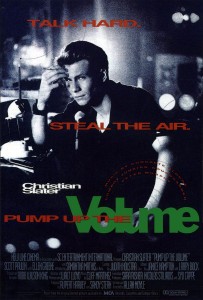 In The 40-Year-Old Critic, Venganza Media creator and host Arnie Carvalho recalls a memorable film for each year of his life. This series appears daily on the Venganza Media Gazette.
In The 40-Year-Old Critic, Venganza Media creator and host Arnie Carvalho recalls a memorable film for each year of his life. This series appears daily on the Venganza Media Gazette.
Okay, down to business. I got my Wild Cherry Diet Pepsi, and I got my Blackjack gum here, and I got that feeling… mmmm… yeah, that familiar feeling, that it’s time to write another movie review.
I think every generation of teenagers has a movie that speaks to them directly. Maybe it’s Rebel Without a Cause or The Breakfast Club or Mean Girls or High School Confidential; there is always a movie that can perfectly capture on screen a snapshot of your fears and concerns, along with the overall attitude of American youth.
For many people my age — the younger members of Generation X — that film is 1990’s Pump Up the Volume, and it is in a large part the reason that I’m writing this entire review series.
The film stars Christian Slater as Mark Hunter, a high school student recently transplanted from New York to Arizona. At school he is an introverted kid who stumbles over his words and mumbles when called on in class. But by night Mark rocks out as Happy Harry Hard-On, a pirate radio DJ — his name stolen from the initials of the Hubert H. Humphrey High School he attends.
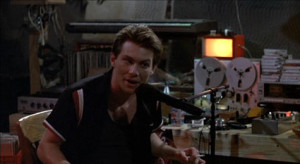
This looks like my studio. Only I have more toys, less records, and no reel-to-reel tape…but that would add atmosphere.
The show becomes a cult phenomenon at the school, with kids gathering nightly to listen in the remote locales that afford the best reception for Hard Harry’s low-powered FM transmission. Their communal experience stretches across class lines and cliques; and while Harry is simulating masturbation and playing banned Beastie Boys songs, he’s unaware that kids are looking up to him. As the audience grows Harry becomes an over-the-air Dear Abby for these pimple-popping pubescents. Unfortunately, one teen reaches out to Harry for help, and, when not satisfied with the response, commits suicide.
This leads to a contrived plot involving police and the FCC tracking down Mark on charges of criminal mischief. The film takes some Goonies-like kids-know-more-than-adults turns that stretch suspension of disbelief, and the last 30 minutes kind of fall flat as Mark tries to outsmart his pursuers. But the first hour truly succeeds in capturing the feeling of teen angst and insecurity shared by many high school students.
I know this film spoke to me in 1990. Like Mark, I had just moved to a new city, changing high schools in my junior year. That was my second move in three years, and I would live in five different cities over the span of four years. I always managed to make a small group of friends, but I understood Mark’s frustration. Also, like Mark, I avoided much of the situation by throwing myself into entertainment, be it books or films.
Each time I moved and lost contact with friends I’d have more free time to fill. Mark might as well have been speaking for me when he said, “I just arrived in this stupid suburb. I have no friends, no money, no car, no license. And even if I did have a license all I can do is drive out to some stupid mall, maybe if I’m lucky play some fucking video games, smoke a joint and get stupid. You see, there’s nothing to do anymore. Everything decent’s been done. All the great themes have been used up, turned into theme parks. So I don’t really find it exactly cheerful to be living in the middle of a totally exhausted decade where there’s nothing to look forward to and no one to look up to.”
Mark provided verbalization of my first post-modern early-life crisis.
My connection to this character was strengthened by Slater’s previous role as angsty, homicidal high school student J.D. in the dark comedy Heathers.
That film introduced me to the actor and his Jack Nicholson-esque delivery, and that’s why I was drawn to Pump Up the Volume. I have to say up front that Heathers is the better of the two films; both smarter and funnier.
In both films Slater’s character is an angry high school loner who seduces a brunette co-star while revealing the social hypocrisies that surround him. In many ways I saw Pump Up the Volume as a softer, less violent imitation of Heathers. I connected to Mark far more than J.D., the latter character’s mad bomber twist taking it a step too far.
As Mark, Slater took that angst and destroyed the school with words instead of dynamite. Through his one-man show he brought down a corrupt administration, got the girl, and made dozens of teens feel good about themselves.
It is the last point that gives Pump Up the Volume its power. Students call Harry’s hotline with problems so varied that everyone can find something to which they can relate. One pretty blonde girl is tired of pretending to be perfect. A gay teen is frustrated at the bullying he suffers. Another girl is kicked out of school after finding out she’s pregnant.
Gay or straight, male or female, fat or thin, Harry has self-affirming words of wisdom for you: “Feeling screwed up at a screwed up time in a screwed up place does not mean you are screwed up.”
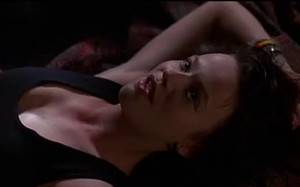
All my listeners have this look of orgasmic rapture on their faces when listening to my podcasts, right? No??
Don’t destroy my fantasy!
In that way Harry becomes a horny radio version of Robin Williams’ John Keating from Dead Poets Society. He realizes that teenage years bring pain, but he’s wise enough to know it’s temporary and won’t matter in five years. (That Mark espoused this so convincingly while also lamenting his own station in life is a dichotomy the script never cares to rectify.)
Mark lives a Superman-like lifestyle. He is a geek by day, and even wears glasses to hide his identity. By night he takes the glasses off and is a microphone superhero. To the teens in his audience, and this teen watching the film, he was an inspiration.
I mentioned in my review of Wall Street that, after seeing that movie, I had no career ambition. Turning 16 years old but having no concept of career goals was frightening. Soon I would have to pick a college, a major, a career, and I had nothing. Yet Happy Harry Hard-On sparked something inside me. He made me realize the true power of words, and how few things are more insidious than a whisper in your ear; few things more important than entertainment that can lift your spirits after a terrible day. Pump Up the Volume made me want to be an entertainer, and, while I would experiment with several avenues, that goal of bringing light to peoples’ day never changed.
In fact, I took a fairly direct path from Pump Up the Volume. Three years after seeing this movie I became a DJ at my college radio station. I never found corruption in the school administration, but I did smoke my share of cigarettes while lamenting into a microphone and wondering if anyone was out there listening. I do know I remotely deejayed a number of parties on and off campus.
And I played more than my share of Leonard Cohen songs. I also must credit Pump Up the Volume for broadening my musical tastes. Cohen’s song “Everybody Knows” launched Harry’s every broadcast and its cynical lyrics resonated with me:
Everybody knows that the war is over
Everybody knows the good guys lost
Everybody knows the fight was fixed
The poor stay poor, the rich get rich
That’s how it goes
Everybody knows
Cohen’s sonorous voice sounded like a funeral march, and this became my anthem. I bought the Pump Up the Volume soundtrack immediately. Though I was disappointed that Cohen’s version of “Everybody Knows” was absent, replaced by Concrete Blonde’s cover, that CD introduced me to the Pixies and Henry Rollins, along with Soundgarden and Sonic Youth years before they broke into the mainstream.
I finally rediscovered Cohen a few years later, but that will be discussed in time.
I still live with Pump Up the Volume as an influence on my life, though as an adult I find few of the characters relatable; my own teenage angst and awkwardness are now, fortunately, long buried in the past. Yet, as I mention this film — which I long considered an obscurity — to people around my age I find we, like Harry’s on-screen audience, had a shared communal experience. Pump Up the Volume became a film that, despite its faults, resonated with us.
Rewatching this film to prepare for this review I found myself connecting with Hard Harry in a new way. When he finally tells the story of how he got started with his pirate radio, it was a familiar one. He started broadcasting thinking no one, or perhaps one special person, was listening. Slowly he realized his show was picking up steam. It was an incredible dream, and one I think nearly every podcaster shares.
Every podcast begins the same way: someone picks up a microphone and starts talking with no clue if anyone will listen. Some shows may have better odds than others, being featured on other podcast feeds and the like, but I know when I recorded my first episode of Star Wars Action News I wondered if anyone would ever hear it. That it got 50 downloads in the first week floored me, that was a number far greater than I’d ever dreamed. I continued to record, and people continued to listen. Like Harry experienced in this movie, my audience grew.
Podcasting is the new pirate radio, and we operate outside the purview of the FCC. And as Harry does at the end of the film I urge each of you to, “seize the air. Steal it! It belongs to you! Speak out! They can’t stop you. Find your voice and use it! Keep this going! Pick a name, go on air. It’s your life, take charge of it. Do it, try it, try anything. Spill your guts out, say shit and fuck a million times if you want to, but you decide. Just fill the air! Steal it! Keep the air alive!”
Until tomorrow’s entry, talk hard!
Tomorrow: 1991
Arnie is a movie critic for Now Playing Podcast, a book reviewer for the Books & Nachos podcast, and co-host of the collecting podcasts Star Wars Action News and Marvelicious Toys. You can follow him on Twitter @thearniec

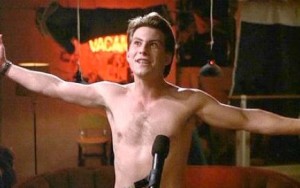
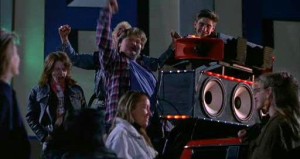
Great review, I have to watch that one again. I had a friend that became an insufferable imitator of ‘Mark & JD’ – but it could have been worse. He could have called himself Ice Ice…